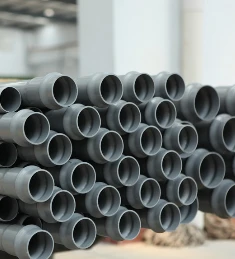नोभ . 19, 2024 16:20 Back to list
High-Density Polyethylene Sewer Pipe Applications and Benefits for Modern Plumbing Systems
The Advantages and Applications of HDPE Sewer Pipe
High-Density Polyethylene (HDPE) sewer pipe has emerged as a preferred choice for wastewater management systems in both urban and rural settings. Its increasing popularity stems from its unique combination of physical attributes, financial efficiency, and long-lasting performance. This article discusses the advantages and diverse applications of HDPE sewer pipes, shedding light on why they have become a staple in modern plumbing infrastructure.
Superior Strength and Flexibility
One of the most significant advantages of HDPE pipes is their impressive strength-to-density ratio. HDPE is highly resistant to impacts and has excellent tensile strength, making it ideal for environments that experience soil movement, shifting, or seismic activity. The flexibility of HDPE allows it to bend without breaking, making it easier to install in various terrains. This characteristic also reduces the need for additional fittings and joints, which can be points of failure in conventional piping systems.
Corrosion and Chemical Resistance
Traditional sewer pipes, made from materials like concrete or metal, often suffer from corrosion and chemical degradation. HDPE sewer pipes, however, boast remarkable resistance to a wide array of chemicals, including acids, bases, and salts. This property not only extends the lifespan of the pipeline but also minimizes maintenance costs, reducing the frequency of costly repairs and replacements. As a result, municipalities and private sectors can save significant resources over the lifetime of the pipeline system.
Cost-Effectiveness
While the initial installation cost of HDPE sewer pipes may vary, the long-term savings are substantial. Their lightweight nature makes them easier and less expensive to transport and install. Construction teams can move HDPE pipes with minimal equipment, which can decrease labor costs. Moreover, the reduced likelihood of maintenance required over time adds to the financial benefits, reinforcing the notion that investing in HDPE infrastructure might be more economically feasible in the long run compared to traditional materials.
hdpe sewer pipe

Sustainability and Environmental Benefits
The environmental impact of various construction materials is an increasingly critical concern, and HDPE pipes shine in this regard. Made from recycled materials, HDPE is 100% recyclable at the end of its lifecycle, which significantly reduces landfill waste. Furthermore, the energy required to produce and install HDPE piping is less than that of conventional sewer materials. These factors contribute to a smaller carbon footprint, aligning with global efforts to enhance sustainability in construction and infrastructure development.
Adaptability to Various Applications
HDPE sewer pipes are not only suitable for municipal wastewater systems; their versatility makes them ideal for various applications. These include agricultural drainage, residential sewage systems, industrial effluent lines, and stormwater management systems. The adaptability of HDPE allows it to be utilized in trenchless technology applications, such as pipe bursting or slip lining, which further minimizes disruption to existing infrastructure and reduces environmental impact.
Conclusion A Future-Forward Solution
As the demand for more efficient and sustainable sewer systems continues to grow, HDPE sewer pipes represent an innovative solution that aligns with modern infrastructural needs. Their durability, resistance to corrosion, cost-effectiveness, and environmental benefits make them a logical choice for stakeholders looking to enhance wastewater management systems. With urbanization and population growth driving the need for reliable plumbing solutions, the adoption of HDPE in sewer systems is not just a trend—it's a step toward future-forward infrastructure that prioritizes longevity and environmental stewardship.
In conclusion, HDPE sewer pipes hold the promise of revolutionizing wastewater management and contributing to the overall health of our infrastructure. As more municipalities and developers recognize the benefits of this material, we can expect an accelerating shift toward HDPE piping solutions, paving the way for a more sustainable and resilient future.
-
High-Quality PPR Pipes and Fittings Durable ERA PPR & PVC PPR Solutions
NewsJul.08,2025
-
Black HDPE Cutting Board - Durable, Non-Porous & Food Safe HDPE Plastic Cutting Board
NewsJul.08,2025
-
High-Quality CPVC Panel Durable HDPE & PVC Panels Supplier
NewsJul.08,2025
-
Double PE Welding Rod Supplier - High Strength, Durable & Versatile Welding Solutions
NewsJul.07,2025
-
High-Quality PVC-O Pipe Supplier Durable 75mm PVC Pipe & Connections Leading PVC Pipe Company
NewsJul.07,2025
-
HDPE Drainage Pipe Supplier – Durable & Corrosion-Resistant Solutions
NewsJul.06,2025

